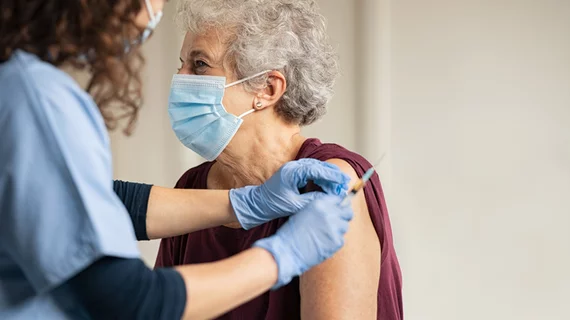How COVID-19 vaccination affects the risk of ED visits for cardiac, respiratory issues
COVID-19 vaccination does not increase a patient’s risk of visiting the emergency department (ED) for significant cardiac issues such as myocarditis or myocardial infarction, according to a new analysis published in the American Journal of Cardiology.[1]
Also, as one might expect, vaccination does appear to significantly lower the risk of ED visits for respiratory infections and COVID-19-related complications.
“Adverse events, including cardiac involvement, after vaccination for severe acute respiratory syndrome coronavirus 2 (SARS-CoV-2) have been reported,” wrote first author Brian C. Case, MD, a cardiologist with MedStar Washington Hospital Center, and colleagues. “We sought to evaluate trends of hospital encounters for vaccine recipients before and after vaccination.”
Case et al. examined data from vaccinated patients in the MedStar Health system, which includes 11 U.S. hospitals, from December 2020 to August 2021. ED information from 60 days prior to vaccination were compared to ED data from 30 days following vaccination.
The analysis examined more than 6,700 ED visits in all. While 1,779 ED visits included patients who were fully vaccinated, another 1,420 included patients in the “vaccination window,” meaning they had only received their first of two vaccine doses. Another 3,552 patients had not yet been vaccinated at the time of the ED visit.
A majority of patients received the Pfizer-BioNTech vaccine, though some patients also received either the Moderna vaccine or the Janssen/Johnson and Johnson vaccine.
Overall, the team found “no significant” association between vaccination and the likelihood of presenting at the ED for acute coronary syndrome, pericarditis, myocarditis, heart failure, conduction abnormalities or noncardiac conditions.
Meanwhile, ED visits related to respiratory infections saw a significant decrease after vaccination. And the rate of ED visits related to COVID-19 complications dropped from 5.4% among patients who had not yet been vaccinated to 1.6% among fully vaccinated patients.
“Early on, during the COVID-19 vaccine development, there were reports of thromboembolic events thought to be related to the vaccines,” the authors wrote. “However, this was not seen in our large cohort, and this initial possible relation is unlikely.”
The team also noted that this study “further highlights the effectiveness of the COVID-19 vaccine overall.”
Related COVID-19 Cardiology Content:
A potential new treatment for COVID-19 patients with MIS-C
Q&A: William Zoghbi breaks down the future of echocardiography
New CDC guidance: Waiting longer between COVID-19 vaccine doses could reduce risk of heart damage
41% of Americans have experienced heart-related issues during the pandemic
Reference:

